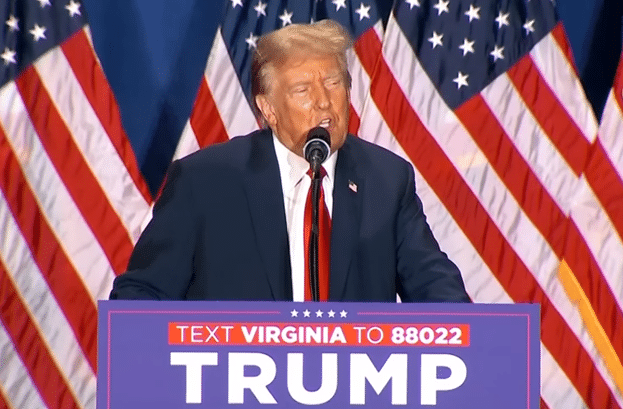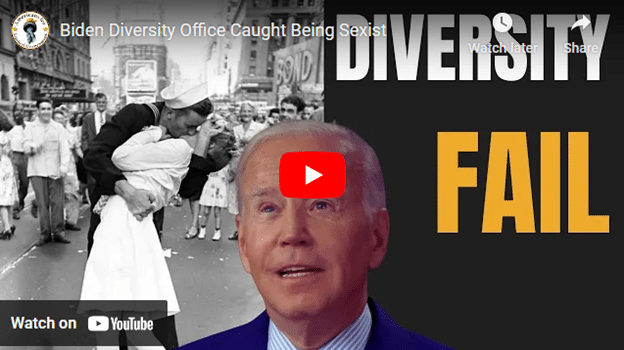March 13, 2024
Permission to republish original opeds and cartoons granted.
Working Class, Young and Minority Voters Were Instrumental in Trump’s Win in Virginia Primary

By Bill Wilson
Last week’s Super Tuesday primary contests solidified Former President Trump as the GOP nominee after Gov. Nikki Haley’s lackluster performance led her to suspend her campaign, and revealed Trump’s working-class coalition is only growing stronger.
Trump swept the primaries winning over a dozen states and solidified his support among working and middle-class voters, as well as making significant inroads with minorities and younger voters on Super Tuesday.
The vast majority of Republican support went to Trump in Virginia, but the state’s open primary system allows independents and Democrats to vote in the GOP primary and that is where a bulk of Haley’s support stemmed from.
Exit polls from the Washington Post reveal Trump earned a full 79% of Republican votes in Virginia, while Haley earned just 19%. However, 40% of the vote in Virginia’s GOP primary was estimated to stem from non-Republicans, and Haley dominated among Democrats and narrowly won independents.
Around 30% of voters in Tuesday’s Virginia primary were independents according to exit polls and Haley narrowly won them by just one point – 49% to 48%. It is worth noting that Haley won Virginia independents by a much smaller margin – just one percentage point – than she won South Carolina independents who supported her by 25 points. Among the 10% of the electorate who identified as Democrat, Haley dominated, winning 84% of their vote to Trump’s 11%.
While Trump unsurprisingly cleaned up with voters who identified as Very Conservative and with White Evangelical Christians, Tuesday’s primaries revealed the wide, economically driven coalition he is building among working-class voters.
A full 72% of Virginia voters on Tuesday said their most important issues were either the economy (34%) or immigration (38%) and Trump won by a landslide with voters who prioritized both issues.
Trump won voters who said their number one issue is the economy by a nearly 40-point margin – 68% to 29% – and he won voters who prioritize immigration by an even wider 58-point margin – 78% to 20%. Haley won the small 11% of Virginia voters who said foreign policy was their number one issue by 50 points – 74 to 24%.
Trump dominated among younger, economically driven voters, minorities, and those without a college degree, further strengthening his working-class coalition. In Virginia, Trump won younger voters by the widest margin of any age group. He won under thirties by a wide 33 points – 64% to 31%. Haley did slightly better among Millennials, but Trump cleaned up with senior voters winning their vote by 26 points, 62% to 36%.
Trump also bested Haley among non-whites in Virginia, winning their vote by 30 points – 62% to 32% – and he won non-college voters by even more.
Trump won the non-college vote by a striking 59-point margin – 78% to 19% – proving that an America First coalition of working-class voters were active participants on Super Tuesday.
These numbers are more striking when reflecting on the pivotal Virginia Governor’s Race in 2021, when conservative newcomer Glenn Youngkin won a surprise victory against incumbent leftist Terry McAuliffe.
In that race, research conducted by Americans for Limited Government Foundation revealed that Youngkin moved the needle the most in Fairfax County precincts with working-class white, Hispanic, and Asian populations. It was largely a working-class coalition that pushed Youngkin over the finish line, and that voice was strong on Tuesday.
I’ve written before how the non-college vote is a strong predictor of the winner in presidential elections dating back as far as the 1980s. We know that the only time in modern election history when non-college voters have supported a presidential candidate who did not go on to win the general election was in 2020, when Biden lost non-college voters 48%-50% but won the election.
We also know that in the last two presidential election cycles, non-college voters have shifted significantly toward the GOP, throwing their support behind Trump in 2016 and 2020, after flipping to Democrats for Obama in 2008 and 2012.
Trump’s growing support among non-college voters, as well as his ability to court traditionally Democratic groups – younger voters and minorities – is further proof of the growing working-class coalition that is the core of the modern conservative movement.
Bill Wilson is the former president of Americans for Limited Government.
To view online: https://dailytorch.com/2024/03/working-class-young-and-minority-voters-were-instrumental-in-trumps-win-in-virginia-primary/
Video: Biden Diversity Office Caught Being Sexist

To view online: https://www.youtube.com/watch?v=ZK6HFbuqmEI


Philip Wegmann: ‘Did Not Exonerate’: Special Counsel Hur Faces Heated Congress
By Philip Wegmann
For describing President Biden in his report as a “well-meaning, elderly man with a poor memory,” Special Counsel Robert K. Hur was painted by Democratic Party loyalists as an uncaring, ambitious prosecutor with political animus. It started at the top.
“There’s even a reference that I don’t remember when my son died,” the president fumed at a press conference last month the day the Hur report was published. “How in the hell dare he raise that?”
A steady chorus of condemnation followed, outrage summarized by first lady Jill Biden, who wrote in a fundraising email to Democratic donors, “I can’t imagine someone would try to use our son’s death to score political points.”
Except that Hur did not. The president, not the prosecutor, first raised the issue of Beau Biden’s death – and its timing. And while the president quickly recalled the anniversary of his son’s passing, according to the transcript of his five-hour interview released Tuesday, the president struggled to remember the correct year.
“What month did Beau die? Oh, God, May 30-,” Biden began to say while working out a timeline of his steps after the vice presidency but before running for president himself. “2015,” Rachel Cotton, a White House lawyer, replied. The president then asked, “Was it 2015 he had died?”
The transcript, which detailed that exchange, along with his testimony before Congress hours later, undermined the caricatures of Hur that had been cultivated throughout his investigation of Biden’s handling of classified documents. The prosecutor was stone-faced in front of lawmakers, repeatedly declining to speculate beyond the established facts of his investigation, quoting chapter-and-verse from his report. “I did not sanitize my explanation,” Hur said of the report’s conclusion, “nor did I disparage the president unfairly.” Neither side was satisfied with that by-the-book routine.
To Rep. Hank Johnson, a Georgia Democrat, Hur was an opportunist “doing everything you can do to get President Trump reelected” in hopes, he speculated, of later securing a federal judgeship. Not to be outdone, for declining to bring charges against Biden, Rep. Tom Tiffany, a Wisconsin Republican, accused Hur of being “part of the Praetorian Guard that guards the swamp.”
Hur, who was appointed U.S. attorney for Maryland during the Trump administration and confirmed unanimously by the Senate, rejected both characterizations, insisting, “Partisan politics played no part whatsoever in my work.” The report he produced, he continued, “was independent and fair.”
Republicans and Democrats on the committee were already entrenched in their opinions about the investigation and tried to turn the hearing into a contest over whose handling of classified documents and whose mental acuity was worse: the former president or the current one.
Florida Rep. Matt Gaetz advanced a “senile cooperator theory,” alleging that Hur declined to charge Biden because he cooperated with the investigation and because he was an elderly man with poor recall of the facts. Hur disagreed, replying, “based on the evidence,” that he concluded he couldn’t prove “beyond a reasonable doubt to a jury” that Biden intentionally broke the law.
Other Republicans saw an opportunity to put political points on the board. Wisconsin Rep. Scott Fitzgerald attempted to read a definition of senility into the conclusion of the special counsel.
“Mr. Hur, based on your report, did you find that the president was senile?” he asked after quoting Webster’s dictionary. Curt in his response and unwilling to go beyond his published findings, Hur replied, “I did not. That conclusion does not appear in my report.”
On the mental acuity front, more than one Democrat used their time for questioning to play videos of Trump forgetting the names of world leaders, confusing sitting members of Congress for his political rivals, and garbling pronunciations.
The White House welcomed the conclusion of the investigation, particularly the decision by the special counsel not to bring charges. Their longstanding gripe has, instead, been with Hur’s characterization of Biden as a forgetful old man. California Rep. Adam Schiff gave voice to those West Wing concerns by blasting Hur for making “pejorative reference to the president” and choosing to knowingly “ignite a political firestorm.”
When Hur bungled the title and tenure of a former Biden administration official, Dana Remus, a spokesman for the White House counsel’s office, smirked, “It turns out, people just mess up sometimes. Even when they aren’t elderly or well-meaning.”
The hearing lasted little more than three hours, two hours less than the interview with Biden. Its ramifications now rest on the public interpretation of why Hur didn’t bring charges against the president. The debate will likely turn on the issues of innocence and exoneration.
When Washington Rep. Pramila Jayapal hurriedly asserted that Biden had been exonerated, Hur interrupted with a line that will likely play on a loop in attack ads this November. “You exonerated him,” she said, noting the lack of charges. “I did not ‘exonerate’ him,” the lawyer countered as the congresswoman continued, “that word does not appear in the report.”
Rep. Darrel Issa was quick to clarify that Hur had neither found Biden guilty nor innocent. “You did not reach an idea that he had committed no wrong, you reached a conclusion that you would not prevail at trial and therefore did not take it forward,” the California Republican prodded.
“Correct, congressman,” the special counsel replied.
The White House was quick to fall back on an ironclad constitutional principle.
“Well, in America, we do have the presumption of innocence,” White House counsel spokesman Ian Sams told reporters gathered outside the West Wing, “and when a prosecutor spends 15 months investigating a case only to determine that there is no case here and that there will be no charges, and that the case is closed, it only affirms the innocence of the president.”
To view online: https://www.realclearpolitics.com/articles/2024/03/13/did_not_exonerate_special_counsel_hur_faces_heated_congress_150642.html

